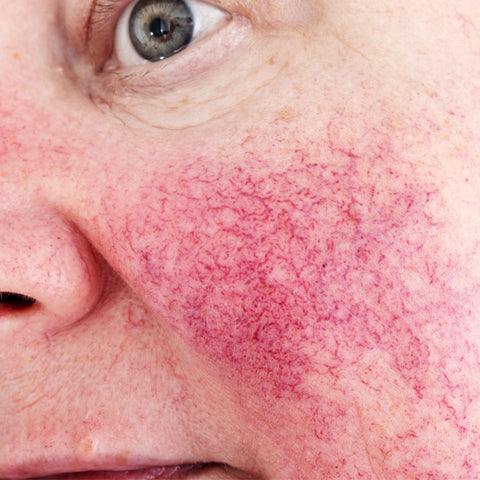
How to clear up rosacea naturally.
Rosacea is a chronic inflammatory skin condition that mostly affects women, in particular those with fair skin, but symptoms can be worse in men. If you are living with rosacea then you already know how challenging the discomfort and irritation can be. Although the exact cause of rosacea is unknown there are natural treatments that can help relieve symptoms and minimize flareups.
Lets take a look at the causes, symptoms and how to manage your rosacea naturally...
What is the main cause of rosacea?
The exact cause of rosacea is not fully understood, although genetics may play a part other factors such as environmental triggers, abnormalities in blood vessels, and an overactive immune system response may play a part too. Additionally, factors such as sunlight exposure, spicy foods, alcohol, hot beverages, temperature extremes, stress, and certain medications can exacerbate symptoms in individuals prone to rosacea. Understanding these triggers can help manage the condition effectively through lifestyle adjustments and targeted treatments.
What are the symptoms of rosacea?
The first sign of rosacea often starts with redness. It may appear like sunburn and can become acute on the cheeks as well as nose, forehead and chin.
Other symptoms include:
- flushing
- bumps or pimples
- broken blood vessels
- sensitive skin
- eye dryness and watering
What does a bad case of rosacea look like?

A severe case of rosacea typically presents as persistent redness across the central part of the face, often accompanied by visible blood vessels (telangiectasia). The skin may appear inflamed, with papules and pustules resembling acne lesions. In some instances, the nose may become swollen and bulbous due to tissue buildup (rhinophyma). Flare-ups can cause intense flushing and burning sensations, leading to discomfort and self-consciousness. These symptoms can significantly impact one's quality of life, both physically and emotionally.
Who is most prone to rosacea?
While anyone can have rosacea and genetics may be a contributing factor, it's more likely to develop in people aged between 30 - 55. Rosacea is also more common in women especially during menopause. Studies have show that people from Celtic or Scandinavian background may also be at higher risk and those with fair skin.
What clears rosacea naturally?
Adjusting your skincare routine is one of the simplest ways to help manage rosacea. A natural gentle approach will help minimize irritation and with the right ingredients can help alleviate symptoms too. Ingredients such as Lemongrass and Aloe Vera have been identified for their effectiveness in helping calm and soothe symptoms and reducing flareups. Use a natural organic cleanser bar and organic moisturiser containing just the right amount of Lemongrass essential oil and Aloe Vera daily for relief and healthy nourished skin.
Lemongrass Essential Oil
Rosacea is characterised by inflammation of the skin, often leading to redness, swelling, and irritation. Lemongrass Essential oil contains compounds like citral and limonene, which possess anti-inflammatory properties, helping to reduce redness and soothe irritated skin. Additionally, its antimicrobial properties can help combat bacteria on the skin's surface, alleviating rosacea symptoms even further. When applied topically, lemongrass products can provide relief from the discomfort associated with rosacea, making it a natural and effective option for managing this condition.
Aloe Vera
Aloe vera has gained recognition for its effectiveness in soothing the symptoms of rosacea due to its potent anti-inflammatory and moisturising properties. The aloe vera plant contains compounds such as polysaccharides, glycoproteins, and antioxidants, which work together to calm the redness, irritation, and inflammation associated with rosacea flare-ups. Additionally, aloe vera's hydrating nature helps to replenish the skin's moisture barrier, reducing dryness and preventing further irritation. Its gentle and soothing nature makes it suitable for sensitive skin.




